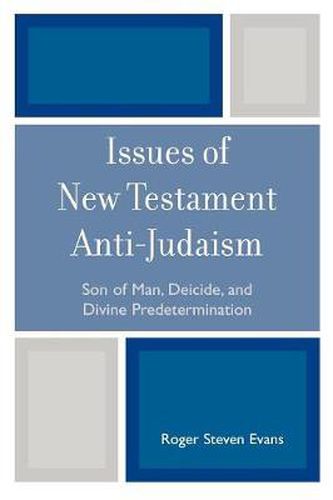Readings Newsletter
Become a Readings Member to make your shopping experience even easier.
Sign in or sign up for free!
You’re not far away from qualifying for FREE standard shipping within Australia
You’ve qualified for FREE standard shipping within Australia
The cart is loading…






Issues of New Testament Anti-Judaism brings a fresh analysis to the emerging conflicts between the earliest followers of Jesus of Nazareth and the leaders of the Jewish communities in Palestine and its environs. Roger S. Evans reveals that embedded in many of the confrontations between Jesus and Jewish leaders is Jesus’ self-identification as the Son of Man. It is this self-identification that further ignites the already simmering conflicts, and the final charge of blasphemy. In the book of Acts and in the canonical Epistles we hear the early Christians accusing the Jewish leaders and people of deicide, but it is also in these documents that the Christian authors continue to hope for and believe that the Jewish people are still part of God’s people. Finally, Evans reminds readers that, according to the authors of the New Testament, it was always God’s plan to send Jesus to die for the sins of his people and the world. This new analysis is intended to inspire both Christians and Jewish people of the twenty-first century to reevaluate how they respond to each other.
$9.00 standard shipping within Australia
FREE standard shipping within Australia for orders over $100.00
Express & International shipping calculated at checkout
Issues of New Testament Anti-Judaism brings a fresh analysis to the emerging conflicts between the earliest followers of Jesus of Nazareth and the leaders of the Jewish communities in Palestine and its environs. Roger S. Evans reveals that embedded in many of the confrontations between Jesus and Jewish leaders is Jesus’ self-identification as the Son of Man. It is this self-identification that further ignites the already simmering conflicts, and the final charge of blasphemy. In the book of Acts and in the canonical Epistles we hear the early Christians accusing the Jewish leaders and people of deicide, but it is also in these documents that the Christian authors continue to hope for and believe that the Jewish people are still part of God’s people. Finally, Evans reminds readers that, according to the authors of the New Testament, it was always God’s plan to send Jesus to die for the sins of his people and the world. This new analysis is intended to inspire both Christians and Jewish people of the twenty-first century to reevaluate how they respond to each other.